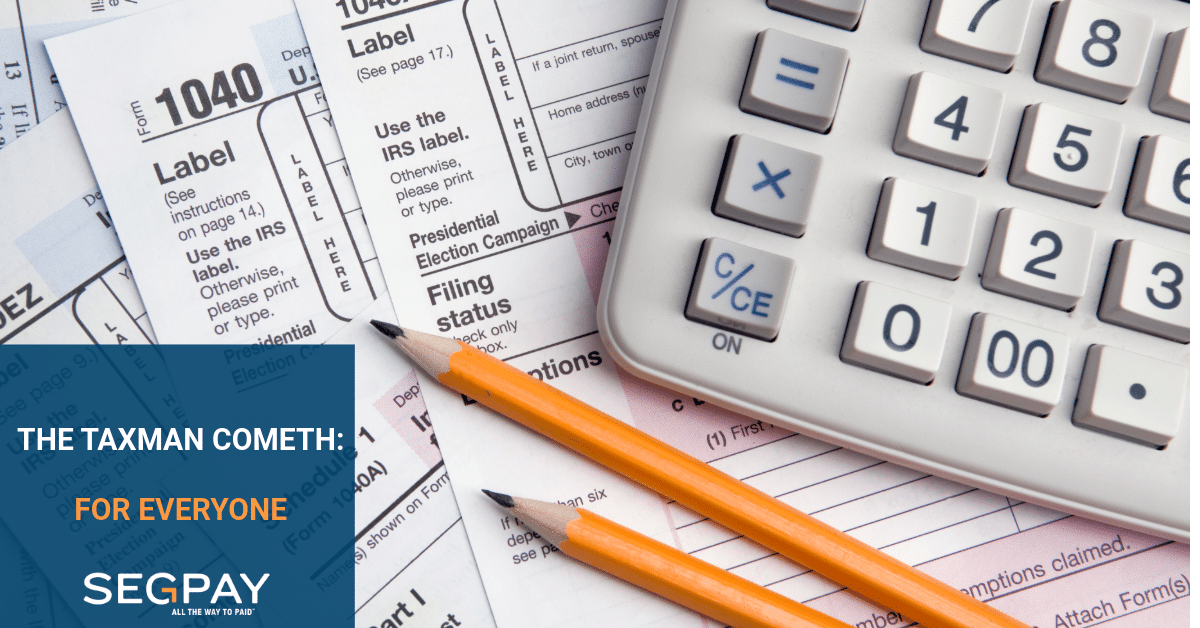- 3 minute read
February is considered the month of love, but it is also a time when many of us need to think about something we feel quite the opposite about — taxes. Yes, April is not far away, and the taxman is always waiting. This year, federal and most state income taxes are due Monday, April 15, 2024. Now is a good time to start getting your paperwork together and saving money for your upcoming tax bill. In the high-risk industry, you may wonder, do I even need to file taxes? This is something no one can or should avoid. Merchant Acquirers/Payment Facilitators, Merchants, and Content Creators are ALL required to file tax returns. This month, we will look at the requirements and where you can find the information necessary to collect to get ahead of the taxman.
All Electronic Payments are Taxed
If you’re lucky enough to live in Alaska, Florida, Nevada, New Hampshire, South Dakota, Tennessee, Texas, Washington, or Wyoming, you probably know that no state taxes are collected. Your preparation for the 2024 tax deadline is a little easier. For the rest of the taxpayers across the U.S., it’s time to start collecting what’s needed to file for the state and federal tax deadlines. Merchant Acquirers/Payment Facilitators must issue 1099-Ks to the government and a copy to all of its merchants by January 31, 2024, for processed funds in 2023. A 1099-K is a form needed if you accept money electronically for selling goods or services. The 1099-K will show gross processed volume, which merchants will need to reconcile chargebacks, refunds, and fees for net sales. It is a way for the government to ensure merchants report their gross revenues properly.
In 2008, the IRS passed legislation that required Merchant Acquirers/Payment Facilitators to report on any merchant that processed over $20,000 in annual volume or 200 transactions. This legislation was modified in 2022, and it is now required to report on any merchant that has processed $600 annually. You should be able to tie the issued 1099-K gross revenues to the annual sales in your acquiring banks or the payment facilitators’ back office.
If your payment processor also handles affiliate and content creator payouts, it is up to the merchant to issue the 1099-K to the government and provide a copy to the affiliate and content creator. Your payment processor should be able to provide the payout data so you can leverage the information for the 1099-K.
Content Creators are NOT Exempt
Just as merchants are required to pay taxes, so are content creators. Last December, it was widely reported that the IRS was reviewing high-grossing OnlyFans content creators. Much of the investigation was driven by the publicity of the OnlyFans creators and their very public display of wealth. So, it’s always best to make sure that if you are public about your success, you can back it up with the taxman.
Tax Timing and Options
Can’t get it all together in time? Don’t worry. If you miss the tax deadline, there are options. You should pay immediately if you owe taxes and miss the April 15th deadline. Every day your tax return is delinquent, the IRS typically charges interest, failure to file penalties, and failure to pay penalties until you file your return and pay your balance due. Don’t put off filing because you can’t afford to pay the amount due on the day you must file your tax return. You can minimize the failure to file penalties by filing as soon as possible and paying as much as possible when you file. You can set up an installment plan to pay the balance. Need more time? Don’t let a looming tax deadline force you to rush through the tax filing process and possibly make a mistake on your return. Simply submit a request for an extension. The IRS typically grants a six-month extension of the tax filing deadline to anyone who requests it. Remember that the tax extension gives you more time to file your return, not more time to pay the tax you owe. You’ll need to estimate the amount you owe and make your payment by the tax filing deadline, even if you file an extension. If you have overpaid your taxes, there is no penalty for filing your taxes late. You should typically file by October 15th. According to the IRS, if you’re filing electronically and are due a refund, you can expect it within 21 days if you choose direct deposit and there are no issues with your return.
Lastly, I am not a tax expert, but this was an important topic to discuss. I always recommend working with a tax consultant to help you with any tax questions. Their experience might also help save you tax dollars owed!
Want to learn more about Segpay?
Contact us Reach out to us with your questions at [email protected]



